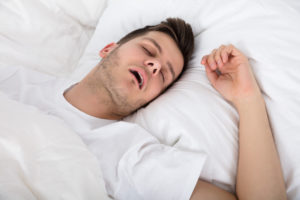
Of course, getting less sleep than you need by choice is one thing; not getting enough sleep due to sleep apnea is another. And it’s not only costing our patients in how much they are able to sleep, but it may also be killing them.
Dr. Volpi and our team at ENT Faculty Practice have extensive experience diagnosing and treating sleep apnea, helping our patients get the good night’s sleep they need.
What is sleep apnea?
We often have patients come to us in our two New York City offices thinking their snoring is sleep apnea. It is true that most people who suffer from sleep apnea do snore, but snoring involves only interference with the airway when sleeping. That interference creates the rasping sounds that are snoring.
Sleep apnea involves partial or complete blockage of the airway dozens of times through the course of the night. This forces the person to wake up to regain muscle control in the throat to reopen the airway. Typically, the person doesn’t become fully conscious after these episodes, but this constant cycle of lack of oxygen and forced awakening results in poor sleep quality. This leads to fatigue, sleepiness, inability to concentrate, depression, and even greater health risks.
Most people with sleep apnea have no idea this is what is going on at night. Sleep apnea is the most under diagnosed medical condition in the U.S. It affects 4 percent of middle-aged men and 2 percent of middle-aged women, yet only a fraction of those people receive sleep apnea treatment.
What are the symptoms of sleep apnea?
These are the common symptoms of sleep apnea:
- Loud snoring
- Abrupt awakenings from sleep
- Awakening with shortness of breath (central sleep apnea)
- Episodes of breathing cessation witnessed by another person
- Waking up with a headache in the morning
- Excessive daytime sleepiness
- Waking up with a dry mouth or sore throat
- Difficulty staying asleep
- Attention problems
- Irritability
What negative effects can sleep apnea have on the body?
We have patients who discount the seriousness of sleep apnea, thinking it’s just a little snoring. That’s a risky line of thinking. Untreated sleep apnea can lead to a number of very serious health concerns:
- High blood pressure — Because you wake up over and over during the night, this process places stress on your body, activating your hormone systems. This raises your blood pressure.
- Heart disease — People with obstructive sleep apnea are more likely to have heart attacks, strokes, and atrial fibrillation.
- Type 2 diabetes — Sleep apnea is common in people with type 2 diabetes. This is because when your body is tired it has trouble effectively processing insulin.
- Weight gain — Sleep apnea can make your body release more of the hormone ghrelin, which makes you crave carbs and sweets.
- Adult asthma — Adult asthma and sleep apnea combined tend to cause the patient to suffer from more asthma attacks.
- Car accidents — People with sleep apnea are up to five times more likely than normal sleepers to have traffic accidents, and to even fall asleep at the wheel.
Do you have symptoms of sleep apnea? Give us a call at New York ENT. Dr. Volpi can treat your sleep apnea with a variety of procedures, everything from a custom-fit oral appliance to uvulopalatopharyngoplasty surgery. Give us a call at 212-873-6036 to schedule your appointment.



